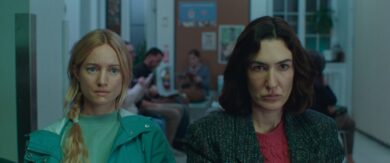 Director Chloé Robichaud’s modernized re-make of Deux femmes en or (the 1970 original was titled Two Women in Gold in English, the remake is simply Two Women) just had the best opening of 2025 for a local production in Québec’s box office. One of the things that has a lot of people talking about the movie is its soundtrack, comprised of well-known songs by powerful female voices, such as Marjo, Mitsou, Louise Forestier, and Lou-Adriane Cassidy, that together create strong inter-generational bridges.
Director Chloé Robichaud’s modernized re-make of Deux femmes en or (the 1970 original was titled Two Women in Gold in English, the remake is simply Two Women) just had the best opening of 2025 for a local production in Québec’s box office. One of the things that has a lot of people talking about the movie is its soundtrack, comprised of well-known songs by powerful female voices, such as Marjo, Mitsou, Louise Forestier, and Lou-Adriane Cassidy, that together create strong inter-generational bridges.
From 1970 to 2025
When it was released in 1970, the film’s original version was carried, musically, by two Robert Charlebois songs, “Miss Pepsi” and the film’s title song. Those didn’t become milestones in his musical career, but they still left a mark. Charlebois’ presence on the soundtrack was as beneficial to his career as it was to the promotion of the film.
So, then, how does one create the soundtrack to a re-make in 2025 that’s as influential as the original one? For director Robichaud, the solution was relatively simple. Because the underlying theme of both films is feminism, “I consciously picked only women for the music, only female voices,” she says. “And the more I dug around, the more I realized what I wanted to do was pay homage to the great female voices that left a mark on Québec culture – plus, it was the perfect movie to do that.”
That’s how, organically, generational bridges were built. In a major ensemble moment, the film features a stunning, lesser-known gem from Louise Forestier’s repertoire: “Pourquoi chanter,” offering audiences a chance to discover, or re-discover, it. Robichaud found the song with the help of Montréal’s Fair Enough, a sync and music supervision agency.
“There’s this moment where Florence [played by Karine Gonthier-Hyndman] sings; it’s in the script,” says Robichaud. “We needed her to sing something that expressed her desire to be more authentic, something with a spirit of liberation. I was having a hard time finding the right song, one that would truly resonate. It was the team at Fair Enough who came back with this idea, and I fell in love with it. The first time I heard it, I got chills. The lyrics are incredible, and for me, Louise Forestier was a link to Robert Charlebois and the original film, so it all just clicked.”
“A New Day Is Dawning”
 Another powerful inter-generational moment comes at the very end of the film, when Lou-Adriane Cassidy performs – in a version recorded specifically for the film – Jacques Michel’s majestic “Un nouveau jour va se lever.” The artist publicly has expressed his enthusiasm about this choice. “For the second time in its existence, my song is elevated by a woman’s voice,” Michel wrote on his Facebook page. “In 1970, it was sung with a political, sovereigntist undertone. Now, 55 years later, Lou-Adriane Cassidy makes it her own with a social lens and an updated interpretation that… brings new light and radiance.”
Another powerful inter-generational moment comes at the very end of the film, when Lou-Adriane Cassidy performs – in a version recorded specifically for the film – Jacques Michel’s majestic “Un nouveau jour va se lever.” The artist publicly has expressed his enthusiasm about this choice. “For the second time in its existence, my song is elevated by a woman’s voice,” Michel wrote on his Facebook page. “In 1970, it was sung with a political, sovereigntist undertone. Now, 55 years later, Lou-Adriane Cassidy makes it her own with a social lens and an updated interpretation that… brings new light and radiance.”
To coordinate the synchronization of copyrights, performances, and the use of these songs in the film, Robichaud’s team worked with Tram7 and its music rights clearance expert Sébastien Lépine (recipient of the Partenaire en musique Award at the 2025 Gala SOCAN). He explains that his work requires a great deal of patience, research, and strong communication skills, in order to clearly convey the intended use of the song being cleared for the film project to its rightsholders. It might seem counter-intuitive, but not every artist wants their work associated with just any images, in any context.
That said, he notes that the work around Two Women was made easier for two reasons. “In many cases, the artists were already familiar with the director’s work, which immediately inspired trust,” says Lépine, and Chloé Robichaud’s feminist vision resonated with several of the singers. “Female artists are naturally more interested in and attuned to this kind of project, where artistic and social values are aligned.”
Marjo & Mitsou
That’s why the team started working on the clearance of Marjo’s “Provocante” very early in the production process, to make sure they would get exactly the song they wanted. The director wanted the actors to belt it out in a way that the audience would understand that they’re doing it for themselves, to elevate an emotion, not to draw attention. “There’s something very powerful in that,” she says.
It was, however, the exact opposite for Mitsou’s “Dis-moi, dis-moi.” “It wasn’t the song I had in mind during the filming of that sequence,” says Robichaud. “I wanted something softer and more poetic, but when we got to the editing room, it just wasn’t working. It’s nearly the halfway point in the movie, and we needed an openly sexual energy; the music had to go in that direction. I thought I’d listen to Mitsou. After all, she was the poster girl for sexual liberation and she was so sexy. That’s when I stumbled upon “Dis-moi, dis-moi,” and I could just see the film’s images fitting perfectly with one another.”
Robichaud confirms the clearing the sync rights happened very organically, especially compared to experiences she’s had for her previous films. “We got great advice from Tram7 and Fair Enough,” she says. Any regrets? “We wanted some Céline Dion, but that’s where we reached our limit,” she says with a giggle. The gamble still pays off just as well, when it comes to the prominence of women, and the generational connections.
Robichaud mentions an interesting nuance: she tapped a man, Philippe Brault, to complete the film’s score with his delicate compositions. “I wanted to establish a contrast between the pop music that makes you want to sing along, and the original score, which is more introspective,” explains the director. “His music is much more poetic and soft.”
Brault agrees. “It’s always a delicate proposition to create a score for a film where so many songs are already in place, but in this case, honestly, it was liberating,” he says. “The songs were already at the service of the energy and rhythm of the comedy, which freed me to compose strictly for the emotional arc of the characters, without having to include humour in it. Chloé really wanted something ‘cinematic,’ and I think the contrast between the slightly old-school scoring and the popular songs really supports the tone of the film.”
The Deux femmes en or soundtrack – featuring Philippe Brault’s original score and Lou-Adriane Cassidy’s cover of Jacques Michel’s “Un nouveau jour va se lever” – is available online.
To learn more about audiovisual post-sync rights, watch this video:

